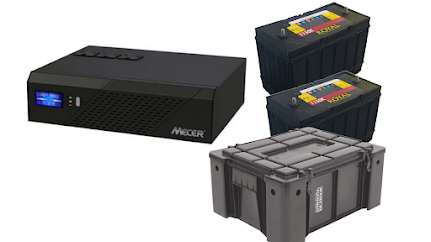
Introduction
Today electricity has become a necessity. All most all of our day to day works requires electricity. We need electricity for laptops, washing machines, electric cookers, Mobile phones, Coolers, etc. If this electricity gets shut down it will cause great disorder. To smoothly run these devices even after the blackout of electricity and get uninterrupted, electrical power systems are discovered. UPS and Inverter are an example of such discoveries. Although these devices work for the same intention, however, people remain confused with the difference between a UPS and an inverter, and they wonder what makes them different. This article will highlight the differences between these two devices so that you can make better use of them, having known their features. Before looking into their differences lets know more about there working.
UPS
UPS stands for Uninterrupted Power Supply. As the name implies, it is used to stop the interruption caused to devices during the blackout of electricity. This system is mainly used with computers where it provides the computer sufficient amount of power to save the data and safely shut down when sudden power blackout occurs.
UPS consists of a rectifier to convert AC into DC and charge the battery. This battery is connected to the inverter which converts the DC into AC. A controller is provided to control the functioning of the system.
UPS can provide power supply only up to 10 to 15 minutes. So, this is mainly intended for IT systems and electronic devices that can get damaged with sudden power out conditions.
Inverter
Inverters are power electronic devices. The main purpose of these device is to convert DC to AC. In inverters, AC power supply is taken from AC mains and converted into DC by a rectifier.
This converted DC charges a battery. As the industrial and household systems work on AC power, the DC from the battery is converted into AC by the inverter. During the power cut, the inverter receives supply from the battery and provides power supply to the electrical equipment. These systems are used in the household to get the power supply after the blackout of electricity. For working of Inverters, no external power supply is needed.
Key Differences Between UPS and Inverter
1) Use Case & Backup Time
If you don’t have power cuts often, you can use a UPS to safeguard your computer from any major hardware failure. The switch to UPS is almost instant, and this doesn’t shut down your computer. UPS typically offers a backup of around 30 minutes or so.
The switching of UPS from the mains supply to the battery is immediate, whereas the Inverter takes more than UPS. For computers, the switching time of inverter is more than it can handle, and it will usually reboot due to the interrupted supply. Thus, UPS are preferred for PC and Inverter for homes as lightbulbs will not care about the switching delay.
UPS can provide backup for your devices for around 15 minutes, whereas an Inverter can provide backup for hours depending on its capacity. The inverter allows you to power the complete house depending on the capacity. So if your area has a more extended power cut, you can use it at least keep a couple of lights and fan running.
2) Maintenance & Lifespan
UPS are maintenance-free. Inverters need more wiring and need to be filled with distilled water at regular intervals. However, I have noticed that some of the advanced versions of inverters have freed consumers from distilled water maintenance.
The disadvantage of UPS is that since the battery is continuously being charged and discharged even when there’s no power cut. Because of this, the battery will wear out 4-5 times quicker than inverter battery.
3) Price
Compared to Inverters, UPS are cheaper. There are different types of UPS and inverters available, and they are available at competing prices.
The factors to look into when buying them includes backup time, capacity, charging time, power requirement, crating (quantity of charge in a fully charged cell), and warranties.


Comments
Post a Comment